
Environmental Engineering Research
Scope & Guideline
Transforming ideas into impactful environmental solutions.
Introduction
Aims and Scopes
- Water Treatment Technologies:
The journal covers advancements in water treatment methods, including novel materials, chemical processes, and biological systems aimed at removing pollutants and enhancing water quality. - Pollution Control and Remediation:
Research in this area emphasizes techniques for controlling and remediating soil, air, and water pollution, including bioremediation, chemical treatments, and the use of innovative materials. - Sustainable Resource Management:
The scope includes studies on resource recovery from waste, life cycle assessments, and the integration of circular economy principles in environmental engineering. - Environmental Impact Assessment:
Papers often discuss methodologies for assessing the environmental impacts of various activities, focusing on risks associated with pollutants and strategies for mitigation. - Emerging Contaminants and Microplastics:
The journal includes research on the detection, behavior, and removal of emerging contaminants, including pharmaceuticals and microplastics, in various environmental media. - Renewable Energy and Waste Management:
Studies related to the conversion of waste to energy and the application of renewable energy technologies in environmental engineering are also a significant focus.
Trending and Emerging
- Advanced Oxidation Processes (AOPs):
AOPs for wastewater treatment are increasingly featured, showcasing their effectiveness in degrading complex pollutants and pharmaceuticals, aligning with global sustainability goals. - Biochar and Biomass Utilization:
Research on biochar and other biomass materials as adsorbents and soil amendments is trending, highlighting their role in pollution remediation and carbon sequestration. - Integration of Machine Learning and AI:
The application of machine learning and artificial intelligence in environmental modeling and monitoring is gaining momentum, indicating a shift towards data-driven approaches. - Microbial Fuel Cells and Bioelectrochemical Systems:
Studies focusing on microbial fuel cells and bioelectrochemical systems are on the rise, reflecting interest in renewable energy generation and wastewater treatment. - Circular Economy Practices:
There is a growing emphasis on circular economy practices, including waste-to-energy technologies and resource recovery, aligning with sustainable development goals. - Impact of Climate Change on Environmental Engineering:
Research addressing the effects of climate change on environmental systems and engineering solutions for adaptation and mitigation is becoming increasingly relevant.
Declining or Waning
- Traditional Wastewater Treatment Methods:
There has been a noticeable decline in studies focusing solely on traditional wastewater treatment methods, as newer and more innovative approaches gain popularity. - Conventional Air Quality Monitoring Techniques:
Research on conventional air quality monitoring is waning in favor of advanced methodologies utilizing IoT and machine learning for more accurate and real-time data. - Single-Contaminant Studies:
Studies focusing on the removal of single contaminants are decreasing, with a trend towards integrated approaches addressing multiple pollutants simultaneously. - Static Environmental Models:
The reliance on static models for environmental assessments is declining, as dynamic and adaptive modeling approaches are favored for their ability to account for real-time changes. - Basic Chemical Treatment Processes:
Research dedicated to basic chemical treatment processes is less frequent, with a shift towards exploring synergistic and advanced oxidation processes.
Similar Journals
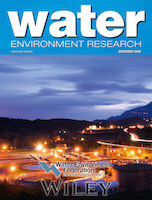
WATER ENVIRONMENT RESEARCH
Innovating research for a cleaner, greener water environment.WATER ENVIRONMENT RESEARCH is a leading scholarly journal dedicated to disseminating cutting-edge research in the fields of water science and technology. Published by WILEY, this esteemed journal (ISSN: 1061-4303; E-ISSN: 1554-7531) is renowned for its rigorous peer-reviewed articles that explore critical issues related to ecological modeling, environmental chemistry, pollution, and waste management. Established in 1992 and continuing through 2024, WATER ENVIRONMENT RESEARCH has secured a notable position within its category quartiles, ranking in the Q2 tier for several disciplines, including ecological modeling and water science and technology. It is highly regarded in the Scopus database, holding a rank of #53 out of 261 journals in Environmental Science related to Water Science and Technology, positioning it in the 79th percentile. As it continues to bridge research and practice, this journal serves as an essential resource for researchers, professionals, and students striving to advance knowledge and foster sustainable solutions within the water environment sector.
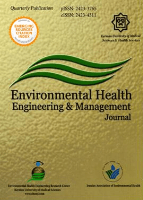
Environmental Health Engineering and Management Journal
Bridging the Gap Between Ecology and Human Well-beingEnvironmental Health Engineering and Management Journal is a premier platform dedicated to the dissemination of research findings in the essential field of environmental health. Published by Kerman University of Medical Sciences in Iran, this Open Access journal has been a beacon of scientific inquiry since its inception in 2014. With an ISSN of 2423-3765 and E-ISSN 2423-4311, it facilitates broad accessibility to cutting-edge research that addresses the complex interactions between environmental factors and human health. With a notable categorization in the Q3 quartile for Environmental Science and Public Health, alongside Q4 in Chemical Health and Safety, the journal underscores its commitment to quality and relevance. Currently ranked #132 out of 233 in Environmental Science within Scopus, it serves as a crucial resource for researchers and practitioners striving to tackle contemporary environmental challenges. The journal's scope includes innovative methodologies, environmental risk assessment, and sustainable health practices, positioning it as an indispensable reference for those invested in improving public health outcomes through environmental engineering and management.
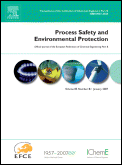
PROCESS SAFETY AND ENVIRONMENTAL PROTECTION
Unraveling the complexities of risk and reliability in engineering.PROCESS SAFETY AND ENVIRONMENTAL PROTECTION, published by Elsevier, is a premier academic journal dedicated to advancing the fields of chemical engineering, environmental science, and safety management. With an impressive impact factor, this esteemed journal undergoes a meticulous peer-review process and serves as a vital platform for researchers, professionals, and students seeking to disseminate cutting-edge research and innovative practices. Submissions are welcome in a wide scope of topics related to safety, risk, reliability, and environmental engineering, demonstrating its influence as a Q1 journal across multiple categories, including Environmental Chemistry and Safety, Risk, Reliability and Quality. By providing a rigorous analysis of current challenges and solutions in the domain since its inception in 1990, it continues to foster interdisciplinary collaboration and practical applications in the United Kingdom and beyond. With the journal not currently offering Open Access options, subscribers gain exclusive access to pivotal insights that shape industry standards and drive advancements in sustainable practices.

Water Conservation Science and Engineering
Pioneering Research in Water Science and EngineeringWater Conservation Science and Engineering, published by SPRINGERNATURE, is a vital academic journal dedicated to advancing the fields of environmental engineering, ocean engineering, waste management, and water science and technology. Since its inception in 2016, the journal has quickly established itself within the academic community, achieving a commendable Q3 ranking across multiple categories in 2023. With an ISSN of 2366-3340 and an E-ISSN of 2364-5687, it is accessible to a global readership eager to explore the latest research and innovations in water conservation and sustainable practices. Although currently not open access, the journal is committed to publishing high-quality scholarly articles that provide insights into effective water management strategies, innovative engineering solutions, and the critical importance of preserving our water resources. Based in Singapore, Water Conservation Science and Engineering aims to foster interdisciplinary collaboration among researchers, professionals, and students, making it an essential resource for anyone passionate about environmental sustainability and preservation.
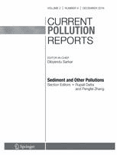
Current Pollution Reports
Unveiling Insights on Water Science and PollutionCurrent Pollution Reports, published by Springer Heidelberg, is an esteemed journal in the field of environmental science, focusing on the multifaceted aspects of pollution, waste management, and water science. With an impressive 2023 impact factor reflected in its status as a Q1 journal across multiple categories—including Management, Monitoring, Policy and Law, Pollution, Waste Management and Disposal, and Water Science and Technology—this journal stands at the forefront of environmental research and policy discourse. The journal, which has been in publication since 2015, aims to provide a platform for scholars and practitioners to share their findings, promoting the exchange of innovative ideas and effective solutions to pressing environmental challenges. With its rigorous peer-review process, Current Pollution Reports serves as an invaluable resource for researchers, professionals, and students committed to understanding and addressing pollution and its impacts on our planet.
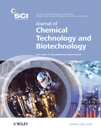
JOURNAL OF CHEMICAL TECHNOLOGY AND BIOTECHNOLOGY
Innovating Sustainable Solutions for Tomorrow's ChallengesJOURNAL OF CHEMICAL TECHNOLOGY AND BIOTECHNOLOGY, published by WILEY in the United Kingdom, serves as a premier platform for research at the interface of chemical engineering and biotechnology. With an ISSN of 0268-2575 and E-ISSN 1097-4660, this journal has established itself as a crucial resource for scholars and professionals, evidenced by its impactful categorization in the Q1 and Q2 quartiles across multiple domains such as Inorganic Chemistry, Biotechnology, and Renewable Energy. The journal encompasses a broad scope that includes innovative research on sustainable technologies, pollution management, and advances in chemical syntheses, making it essential for those pursuing cutting-edge developments in these disciplines. Researchers and practitioners benefit from its comprehensive coverage, as it includes insightful articles, reviews, and case studies that collectively push the boundaries of contemporary science and engineering. With a ranking of Q2 in its various categories and significant percentiles in key fields, the journal stands as a beacon for high-quality scholarship, eligible for impact in both academia and industry.

Rocznik Ochrona Srodowiska
Fostering Interdisciplinary Dialogue in Environmental ResearchRocznik Ochrona Srodowiska, published by the Middle Pomeranian Scientific Society for Environmental Protection, is an esteemed journal dedicated to advancing the field of environmental science in Poland and beyond. With an ISSN of 1506-218X, this peer-reviewed journal has established itself as a vital resource since its inception in 2007, addressing various environmental issues and promoting sustainable practices. Currently holding a Q3 category ranking in the Environmental Science (miscellaneous) field for 2023, it places itself in the 23rd percentile of Scopus rankings, reflecting a growing influence in the broader environmental research community. While the journal is not open access, it serves as an important conduit for researchers, professionals, and students to disseminate their findings and contribute to the interdisciplinary dialogue aimed at tackling pressing environmental challenges. With a commitment to rigorous research and practical applications, Rocznik Ochrona Srodowiska remains an essential platform for fostering innovation and collaboration in environmental studies.

Environmental Sciences Europe
Exploring innovative pathways to environmental resilience.Environmental Sciences Europe is a leading peer-reviewed journal published by SPRINGER, dedicated to advancing research in the field of environmental science, with a specific focus on pollution and its mitigation. Since its transition to Open Access in 2011, the journal has been committed to disseminating high-quality research without barriers, thereby ensuring that critical knowledge is freely accessible to researchers, practitioners, and policymakers around the globe. Based in Germany and with a commendable Q1 ranking in Pollution for 2023, the journal stands out in the Scopus rankings, occupying the 23rd position out of 167 in its category, reflecting its significant impact in shaping environmental discourse. With a convergence of global research efforts projected until 2024, Environmental Sciences Europe aims to provide a vital platform for scholarly communication and collaboration, ultimately contributing to sustainable solutions for pressing environmental challenges.
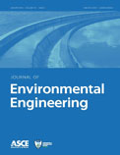
JOURNAL OF ENVIRONMENTAL ENGINEERING
Shaping the future of civil infrastructure through rigorous research.JOURNAL OF ENVIRONMENTAL ENGINEERING, published by the American Society of Civil Engineers (ASCE), stands as a pivotal platform within the realm of environmental engineering and civil infrastructure. With an ISSN of 0733-9372 and an E-ISSN of 1943-7870, this esteemed journal has been delivering high-quality research since its inception in 1973 and continues to play a crucial role in advancing knowledge through to 2024. The journal boasts respectable impact factors, achieving Q2 rankings in Civil and Structural Engineering, Environmental Engineering, and Environmental Science, while also maintaining a solid presence in Environmental Chemistry. With Scopus rankings reflecting a strong competitive advantage across various specializations, it serves as a vital resource for researchers, professionals, and students focused on solving complex environmental challenges. Though not an open-access publication, its rigorous selection process ensures that only high-caliber studies are disseminated, making it an indispensable read for anyone involved in the interdisciplinary fields linking engineering and environmental sustainability. Addressing contemporary issues and shaping future innovations, the JOURNAL OF ENVIRONMENTAL ENGINEERING remains committed to fostering dialogue and disseminating impactful research.
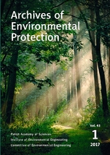
Archives of Environmental Protection
Unveiling the Complexities of Environmental ProtectionArchives of Environmental Protection, published by the Polish Academy of Sciences, is a pivotal journal in the field of Environmental Science. With an ISSN of 2083-4772 and E-ISSN of 2083-4810, this journal serves as a critical platform for disseminating innovative research and comprehensive reviews that address the complexities surrounding environmental issues. As of 2023, it holds a respectable Q3 ranking in Environmental Science, reflecting its relevance and contribution to the academic community, indicated by a Scopus rank of 124 out of 233 in the General Environmental Science category. Although it operates without Open Access, the journal's consistent publication from 2007 to 2024 emphasizes its commitment to advancing knowledge in diverse areas of environmental protection. Researchers, professionals, and students are encouraged to engage deeply with the wealth of insights offered through the rigorous peer-reviewed articles presented in this journal, which strive to foster sustainable practices and environmental stewardship.